In September 2022, Advance CTE and ECMC Foundation announced the second cohort of The Postsecondary State Career Technical Education (CTE) Leaders Fellowship at Advance CTE—Sponsored by ECMC Foundation. The Advance CTE — ECMCF Fellows include representation across multiple demographic categories reflecting the Fellowship’s goal of intentionally building a postsecondary leadership pipeline for underserved populations in Career Technical Education (CTE) that closes racial representation gaps and removes equity barriers to postsecondary leadership advancement. This month, we’re excited to highlight two members of Advance-CTE’s second cohort of Postsecondary State CTE Leaders Fellows. ECMCF Fellow Nancy Ligus (WV) is passionate about finding proactive and equity-focused solutions to reverse the current education and workforce trends in the state.
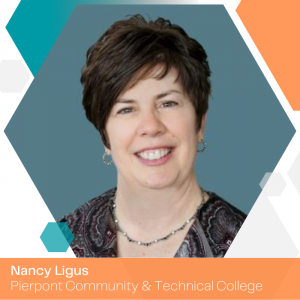 Tell me more about your journey to the Fellowship.
Tell me more about your journey to the Fellowship.
I learned of the Advance CTE Fellowship through a colleague at the West Virginia Community & Technical College System last summer. We’d both previously attended one of Dr. Johnson’s information sessions to learn more about the content of the Fellowship and how participating would give us insight and the tools needed to address the diversity and equity challenges we face in post-secondary education in WV. In my role as Director of Workforce and Economic Development for the WV CTCS, I was connected to all nine WV Community Colleges and their efforts in developing training and meeting the workforce needs in their regions. Although I recognized there were gaps in access and inclusion to Career and Technical Education throughout the state, I hadn’t been involved in any initiatives to address the deeper racial inequities and barriers to career pathways. When I transitioned to my current leadership role at Pierpont Community College in north central WV, I realized that I needed the right tools to address these challenges. I saw the Fellowship as a way that I could gain those skills, knowledge, and significantly greater understanding that I could put into action.
What skills or areas have you experienced the most growth in the program?
Through my experience in the Fellowship, I’ve grown my understanding of how systemic policies play a huge role in creating and perpetuating barriers of access to high-quality CTE programs for marginalized populations. Our state has the lowest labor participation rate, low education attainment, and generally a perception of poor educational performance and outcomes, but my new knowledge has allowed me to feel more confident sharing my ideas with other workforce development leaders and collaborating on proactive approaches to reverse these trends.
As I oversee the workforce programs at my college and collaborate on career pathways, I look at each one with a new lens. I feel empowered to anticipate some of the challenges and understand how to overcome them to create more possibilities for people. I’m also bringing what I’ve learned to my staff and other leaders in my college as we are moving out of a transitional period since the pandemic. It seems so timely; we’re sort of starting over to recapture our community’s awareness of what the college’s role is within our region, and it’s a good time to incorporate policies to reflect our commitment to equity.
Have you been tapped for new or more advanced roles within your organization as a result of your experience in the Fellowship?
While I currently only represent one region in WV, I’ve been invited to participate in several state-wide initiatives which will be very important to the state’s future workforce and economic development. When I’ve had the opportunity, I connect relevant learnings and resources from Advance CTE and the Fellowship to inform my work. I feel like these insights are appreciated and I feel proud to be the person introducing others to innovative ideas from our workshop speakers and discussions.
One of my objectives for participating in the Fellowship was to pass on my knowledge to future potential leaders and mentor others to continue this important work. That’s certainly been the case at Pierpont Community & Technical College, where I am currently working with the academic leadership to develop more career pathways and create strategies for addressing equity gaps. I serve on several grant committees, and having this experience has given me more appreciation for incorporating my Fellowship-based understanding of racial equity into the planning and implementation of funding.
How has your experience in the fellowship helped you explore new spaces or positions in postsecondary state CTE leadership?
I’ve always been the type of person to seek out opportunities to take my experience and knowledge to a new level. Since participating in the Fellowship, I feel I’m gaining a whole new skill set to add to my range of knowledge in the workforce development space. In my previous position at the WV CTCS, my team and I worked hard to advocate for high-quality CTE programs. While I wasn’t always able to see this labor come to fruition, I feel more confident that I could bring both my post-secondary leadership roles together; knowing what it takes for a community college to put an effective training program together at ground level, with the big-picture knowledge and experience driving and supporting the effort. If I could create my own position, it would be something like Director of Workforce Projects or a role that allows me to serve in a DEI advisory capacity to develop equity-minded practices and policies across the college system and lead a council with representation from each college to share ideas and challenges that may be unique to their area of service.
How has the Fellowship expanded your network?
As a member and Fellow, I am grateful for the wide breadth of the Advance CTE network and resource access. Not only are the resources provided to us through the workshops and speakers, etc. incredibly informative, but the Fellows themselves are exceptional leaders and resources in their own right! This exposure has revealed where there are still many opportunities for growth in postsecondary education. Seeing and hearing what other colleges are doing to address these challenges through this network, especially through the lens of racial equity, reinforces to me that changes need to be implemented now.
To connect with Nancy, email nancyl.ligus@gmail.com.


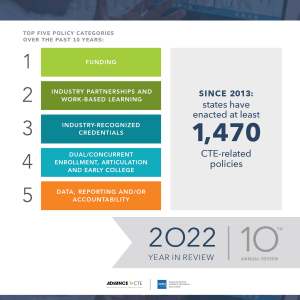
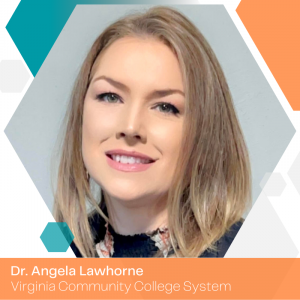 Dr. Angela Lawhorne
Dr. Angela Lawhorne Nancy Ligus leverages her
Nancy Ligus leverages her  Leisa Mathews’
Leisa Mathews’ 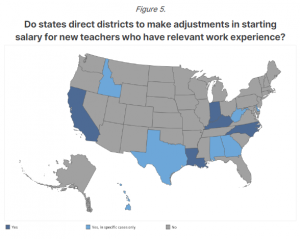
 Lawmakers Return to Capitol Hill
Lawmakers Return to Capitol Hill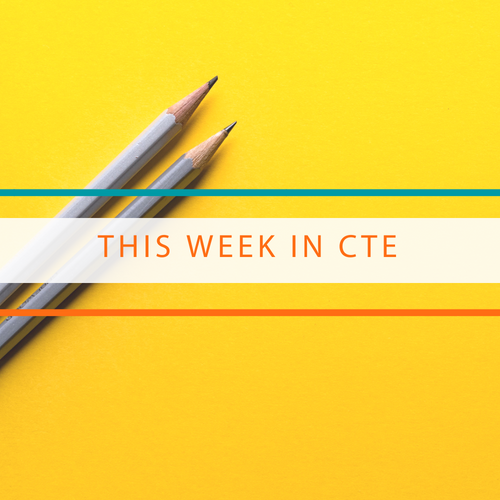 Developed with input from nearly 200 national, state and local education and workforce development leaders and supported by 40 national organizations,
Developed with input from nearly 200 national, state and local education and workforce development leaders and supported by 40 national organizations,  Before becoming the Chancellor of West Virginia’s Community and Technical College System (WVCTCS), Dr. Tucker was a self-proclaimed “data geek” who worked in policy and planning. Dr. Tucker analyzed data that examined who was attending college, who wasn’t and what happened to students once they arrived at college. From that work, Dr. Tucker soon realized that West Virginia’s state workforce needs would not be met if low graduation rates persisted. Dr. Tucker applied for and received a grant that allowed her to play a role in revamping the state’s approach to development education, which resulted in a full scale corequisite redesign of remedial education. As Chancellor of the of the WVCTCS, and now Interim Chancellor of the state’s four-year system of higher education, Dr. Tucker has played a key role in promoting high-quality Career Technical Education (CTE) programs.
Before becoming the Chancellor of West Virginia’s Community and Technical College System (WVCTCS), Dr. Tucker was a self-proclaimed “data geek” who worked in policy and planning. Dr. Tucker analyzed data that examined who was attending college, who wasn’t and what happened to students once they arrived at college. From that work, Dr. Tucker soon realized that West Virginia’s state workforce needs would not be met if low graduation rates persisted. Dr. Tucker applied for and received a grant that allowed her to play a role in revamping the state’s approach to development education, which resulted in a full scale corequisite redesign of remedial education. As Chancellor of the of the WVCTCS, and now Interim Chancellor of the state’s four-year system of higher education, Dr. Tucker has played a key role in promoting high-quality Career Technical Education (CTE) programs.